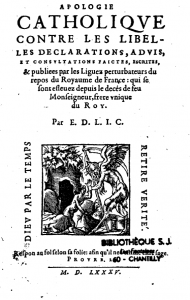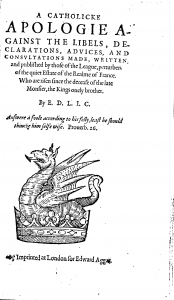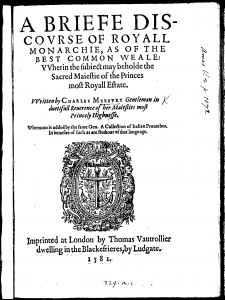But our Prince, who is the Image of God on Earth, and as it were Un minor essempio [‘a lesser example’] of his almightie Power, is not to acknowledge any greater then him selfe: nor any authoritie greater than his owne.
Charles Merbury, A Discourse of Royal Monarchy (London: 1581), 43
But what are kings when regiment is gone, / But perfect shadowes in a sun-shine day?
Christopher Marlowe, Edward II (c. 1592-3), V.i.26-7
Linking Marlowe’s works to contemporary theories of monarchy is one of the project’s key research objectives. Practically speaking this has meant investigating the English reception and circulation of works of royalist thought, mostly printed abroad, during Marlowe’s lifetime. (I prefer the word ‘royalist’ to ‘absolutist’; some royalist works were absolutist, but not all). The main source of such ideas was France, although occasionally Italian or Spanish influences can be detected too.
On this page you’ll find some examples of the project’s research. There’s a video, above, which introduces the theme and offers some preliminary thoughts about Marlowe’s plays.
1. Edward Aggas and A Catholicke Apologie
Royalist ideas were congenial to the Elizabethan establishment, as long as they weren’t anti-Protestant. As a result, English printers sometimes got involved in disseminating foreign royalist literature. Pierre du Belloy’s Apologie Catholique (printed as by ‘Edouard Lallouette’) was published by Edward Aggas in 1585.
Written by a Catholic in favour of the succession of a Protestant, Henri of Navarre, to the French throne, the tract was one of the most widely circulated of all French royalist works of the 1580s. Radical Catholic thinkers, French and English, singled it out in later works for violent attack. Aggas, who specialised in texts relating to France, translated the work himself.
2. Jean Bodin: French versus Latin texts, female rule, and the ‘politique’ reception of continental thought
The royalist work that had the most impact on English culture was Jean Bodin’s Six Livres de la Republique, first published in France in 1577. Two years later the gossipy academic, Gabriel Harvey, was reporting that Bodin’s work was part of a fashion for ‘French and Italian politique writings’ among Cambridge students – including, for example, Louis le Roy’s commentaries on Aristotle’s Politics.
Harvey’s comment is a reminder that how works were received can differ from how they were intended. It implies that English readers were as much interested in Bodin’s ‘politique’ style of argument as in his specific arguments about ‘sovereignty’ or his strong preference for hereditary monarchy (the issues on which modern interpreters tend to focus). Of course, ‘politique’ is a somewhat plastic term, even as Harvey used it.
The reasoning which did provoke English readers’ attention was Bodin’s pronounced aversion to the rule of women. It became a target of criticism in government-sponsored literature, such as John Bridges’ A Defence of the Gouernment established in the Church of Englande for ecclesiasticall matters (1587), a work usually known now for kicking off the Martin Marprelate controversy, involving Puritanism, a couple of years later. Bridges read Bodin’s text in its Latin version of 1586, which Bodin had undertaken partly after discovering, during a diplomatic visit, that his ideas were being interpreted ‘in a difficult and irksome manner [difficili ac molesta ratione]’ in England, including in Cambridge University where Marlowe was then studying. ‘Manner’ [ratione] here can also mean ‘method’, suggesting that the problem was as much one of intellectual culture as simple misinterpretation. For his part, Bridges claims to have received Bodin’s personal assurances (evidently flouted) that he would revise his views on female rulers. The distribution of annotations in surviving copies suggests that translating Bodin’s French text into Latin certainly broadened its English readership, even if it didn’t endear him to people like Bridges.
You can not stepp into a schollars studye but (ten to on) you shall litely finde open ether Bodin de Republica or Le Royes Exposition uppon Aristotles Politiques or sum other like Frenche or Italian Politique Discourses.
Gabriel Harvey (c.1579), The Letter-Book of Gabriel Harvey, ed. E.J.L. Scott (London: 1884), 79
Hee [Bodin] hath since contrarie to his certified conscience, and (as some saie) to his solemne promise, not onelie renued but amplified and aggrauated his former follies. And where they were halfe hid before among his French, he hath now translated them into Latine, as by a tongue vniuersally more knowen, to deface the gouernment of women in all nations, but alacke poore, vainglorious and intemperate man, in the iudgement of all godlie wise, hée procureth but his owne blemish.
John Bridges, A Defence of the Government Established in the Church of Englande (London: 1587), 787
3. Charles Merbury’s Briefe Discourse and ‘home-grown’ royalism.
The historian Peter Lake once argued in Anglicans and Puritans (1988; pp.64-5) that there were absolutist inclinations in Anglican polemic of the late sixteenth century. It is true that defences of the royal supremacy over the English Church, like that mounted by Bridges, often have royalist overtones.
Similarly, one of the few ‘original’ English political tracts of the 1580s, Charles Merbury’s A Discourse of Royall Monarchy (1581), devotes many pages to rehearsing the disadvantages of elective monarchy; some of his arguments strongly resemble Bodin’s, in fact. The otherwise obscure Merbury was a friend of Michael Hicks, the secretary of William Cecil, Lord Burleigh. Perhaps significantly, Merbury spent a lot of time abroad and was heavily influenced by Italian culture. The fact that he appended a list of Italian proverbs to his treatise suggests he may have intended it as a bid for employment as a ‘foreign’ secretary, by the crown or a leading nobleman.
4. Marlowe and monarchy
Debates over the rights of monarchs and subjects were critical to the ideological climate of the late 1580s and early 1590s and can be felt in most plays of the period. However, as Merbury’s treatise suggests, they tended to be represented in a somewhat one-sided way. This was a time when the political and ecclesiastical establishment were unusually jumpy and censorious. The ideologically cautious and ultimately royalist tone of Marlowe’s Edward II or indeed The Massacre at Paris (1592-3), which ends with Henri III invoking standard divine-right theology, must be seen in this context.
But as I suggest in my video (above), Marlowe was also stimulated imaginatively if not psychologically by contemporary ideas of monarchical sovereignty. In many plays this sort of power is a subjective desideratum, and is aligned with satisfaction of desire and personal autonomy. Marlowe explores the tragic contradictions of sovereignty in the protagonists of Dido Queene of Carthage and Edward II.
The question as to whether Marlowe was himself royalist (or absolutist) is difficult to answer and perhaps not worth asking. The term ‘absolute’ has been used of the hyperbolical immersiveness of Marlowe’s dramatic and literary style. Somewhat paradoxically, he is also often considered a ‘sceptical’ writer – which suggests an opposite movement of withdrawn neutrality. In my view, his plays tell us more about the dramatic potency of royalist ideas than whether their author supported or ‘subverted’ them.
Monarchy was a subject addressed in the project’s drama workshops. Click here to find out about the workshops the project ran around a scene in 1 Tamburlaine.


